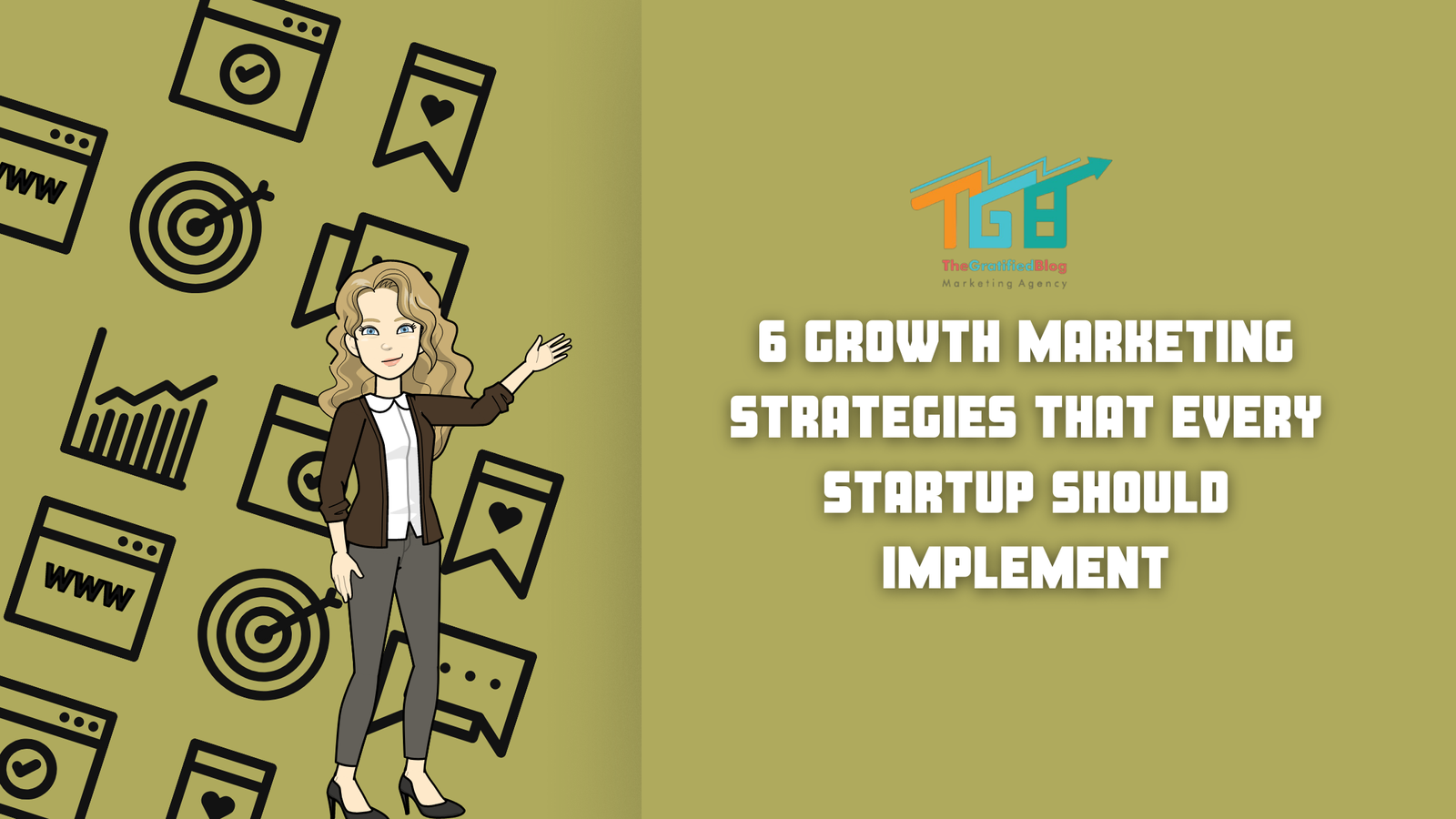
In today’s highly competitive business landscape, every company strives for explosive growth and significant market share. Growth marketing, an innovative approach to traditional marketing, has emerged as a game-changer in achieving remarkable results.
Unlike conventional marketing techniques, growth marketing focuses on a data-driven, agile, and iterative approach to drive accelerated growth.
In this article, we will explore the top growth marketing strategies that can propel your business to new heights and help you achieve explosive results.
What Is Growth Marketing?
Growth Marketing is a dynamic approach that focuses on achieving rapid and sustainable business growth. It goes beyond traditional marketing strategies by combining data-driven analysis, experimentation, and creativity.
This discipline aims to identify scalable and efficient ways to attract and retain customers, ultimately driving revenue and market expansion. At its core, Growth Marketing relies heavily on metrics, tracking key performance indicators (KPIs), and analyzing user behavior to optimize marketing campaigns.
It emphasizes experimentation and iterative improvements, using A/B testing and other methodologies to refine strategies and maximize results.
The goal is to identify the most effective channels, messaging, and tactics to drive user acquisition, engagement, and conversion.
Unlike traditional marketing, Growth Marketing takes a holistic approach, encompassing various facets of the customer journey. It considers the entire funnel, from initial awareness to final conversion, and places a strong emphasis on retaining and nurturing existing customers.
By leveraging data and analytics, growth marketers are able to make data-informed decisions and tailor their strategies to individual customer segments.
Why To Invest In Growth Marketing?
Investing in growth marketing has become a crucial strategy for businesses seeking to thrive in today’s competitive landscape.
Unlike traditional marketing approaches, growth marketing, led by a skilled growth marketing strategist, focuses on data-driven, iterative, and scalable techniques to rapidly expand a company’s customer base and revenue.
By continuously experimenting, analyzing, and optimizing campaigns using growth marketing strategies, businesses can identify the most effective channels and messages, maximizing their return on investment.
It plays a vital role in guiding these efforts, bringing their expertise to foster a customer-centric approach, leveraging insights to understand and cater to the evolving needs of the target audience.
Embracing growth marketing empowers businesses to adapt swiftly to market changes, outpace competitors, and unlock untapped opportunities, ultimately propelling sustained growth and long-term success in an ever-evolving business environment.
Growth Marketing Strategies
When it comes to growth marketing strategies, there are numerous approaches you can take to drive business growth. Here are the best growth marketing strategies:
Content Marketing
Create valuable and engaging content that resonates with your target audience. This can include blog posts, videos, infographics, and social media content. Distribute your content through various channels to attract and educate potential customers.
Utilize SEO techniques to improve your content’s visibility and reach. Measure the effectiveness of your campaigns through analytics and customer feedback.
Adapt your strategy based on insights to optimize performance. Establish yourself as an industry authority by consistently providing valuable information. Encourage user-generated content and foster a sense of community around your brand.
Collaborate with influencers and partners to expand your reach and credibility. Stay updated on industry trends and incorporate them into your content. Cultivate long-term relationships with your audience by maintaining authenticity and relevance.
Search Engine Optimization (SEO)
Optimize your website and content for higher search engine rankings. Conduct keyword research, refine on-page elements, and secure high-quality backlinks to enhance organic visibility and increase website traffic.
Utilize SEO techniques to attract targeted audiences and boost your online presence. Improve page loading speed and mobile responsiveness for a better user experience. Regularly update and refresh content to maintain relevance and credibility with search engines.
Utilize meta tags and descriptive titles to improve click-through rates in search results. Leverage social media and content marketing to expand your reach and engage with your audience. Monitor analytics to track performance and make data-driven improvements.
Stay informed about the latest SEO trends and algorithm changes to adapt your strategies accordingly. Consistently provide valuable and relevant content to establish authority and trust with both users and search engines.
Social Media Marketing
To maximize your business’s potential, the role of a growth marketing manager becomes invaluable in today’s digital landscape.
You can leverage popular platforms such as Facebook, Instagram, Twitter, LinkedIn, and more to connect with your target audience, build brand awareness, and drive traffic.
Developing a well-defined growth marketing strategy is paramount, ensuring that you create compelling content that not only resonates with your audience but also fosters engagement, ultimately leading to the growth of a loyal community.
It is crucial to consistently track metrics and analyze results to refine your approach and stay on top of your marketing game.
By closely monitoring key performance indicators (KPIs), you can identify areas of improvement and implement data-driven optimizations to maximize your marketing efforts.
It is vital to promptly respond to comments and messages from your audience. This level of engagement demonstrates your commitment to customer satisfaction and strengthens your relationship with customers and followers.
It allows you to gather valuable feedback and insights that can further inform your growth marketing strategies.
Email Marketing
Build an email list of prospects and customers by implementing growth marketing strategies. Using campaigns to nurture relationships, promote products, and drive conversions is a key aspect of growth marketing.
Personalize emails to create a more personalized experience for recipients, segment the audience to target specific groups, and track campaign performance to measure effectiveness and make necessary improvements.
To engage with interested prospects, create targeted content and offers that resonate with their needs and preferences. Leveraging automation tools allows for the timely delivery of relevant messages, further enhancing the user experience.
By analyzing data and metrics, you can refine your growth marketing strategies and improve email engagement rates. It is crucial to always prioritize data protection and privacy regulations when collecting and handling customer information.
Email marketing remains a powerful and cost-effective tool that businesses of all sizes can utilize to directly reach their audience.
To maximize the impact of your email marketing efforts, it’s essential to continuously optimize and experiment with different approaches and techniques.
Conversion Rate Optimization (CRO)
Conversion Rate Optimization (CRO) involves analyzing and optimizing your website’s user experience to boost conversions.
Test various elements like headlines, calls-to-action, forms, and landing pages to enhance conversion rates and maximize traffic value, while also incorporating growth marketing strategies.
By continuously experimenting and refining strategies, CRO combines the data-driven approach of growth marketing to help in achieving higher engagement and better results.
This data-driven growth marketing approach ensures that your website attracts more customers, converts visitors into leads or sales, and ultimately improves your overall business performance.
Implementing CRO strategies, alongside growth marketing techniques, can lead to increased revenue, improved return on investment (ROI), and a more efficient utilization of your marketing resources.
It’s an essential process for businesses seeking to optimize their online presence and achieve long-term success in the digital landscape.
Influencer Marketing
Partner with industry experts and influencers boasting a substantial following in your target market for effective growth marketing strategies.
Their endorsement can amplify your brand, products, or services, expanding your reach and credibility in the market. Embrace authentic collaborations that align with your brand values for the most impactful results.
Engage influencers with a genuine interest in your niche to ensure an authentic connection with their audience and foster growth marketing strategies that resonate.
To achieve success, create compelling content that not only resonates with the influencer’s followers but also communicates your brand’s message effectively.
Utilize data-driven insights to monitor and track campaign performance, enabling you to optimize results and ensure a high ROI.
Throughout your influencer marketing endeavors, stay transparent with sponsored content, adhering to ethical marketing practices.
Building long-term partnerships with influencers is crucial, as it fosters lasting brand advocacy and nurtures sustainable growth marketing strategies. Remember, the right influencers can be the key to unlocking the full potential of your growth marketing approach.
Referral Programs
Encourage your existing customers to refer friends, family, or colleagues with incentives as part of your growth marketing strategies. Create an easy-to-use referral system to track successful referrals and reward participants.
Word-of-mouth marketing can boost customer acquisition and loyalty, serving as a powerful tool in your overall marketing efforts. Personal recommendations build trust and credibility for your business, driving organic growth.
To maximize the effectiveness of your referral program, choose rewards that align with your target audience’s interests and needs.
Monitor and analyze the program’s performance regularly to identify areas for improvement and optimize its outcomes. Utilize social media and email marketing channels to promote the referral program and reach a wider audience.
Offering exclusive deals or discounts to both referrers and their referred customers can provide additional motivation for participation. Don’t forget to express your gratitude to referrers for their valuable contributions, as their advocacy plays a crucial role in expanding your customer base.
By implementing a well-executed referral program, you can significantly enhance your growth marketing strategies and propel the growth of your business.
Partnerships And Co-marketing
To achieve effective growth marketing strategies, one approach is to identify non-competing businesses with complementary products/services and a shared target audience.
By forming strategic partnerships with these like-minded companies, opportunities for cross-promotion and joint marketing campaigns can be leveraged for mutual benefit.
This collaborative effort allows each partner to capitalize on their strengths, reaching a wider audience and maximizing impact and visibility. They can pool resources to create innovative co-branded offerings, tapping into new markets and customer segments they may not have reached individually.
By associating with reputable partners, they establish trust and credibility, further enhancing their brand image. This cooperative marketing approach fosters long-term success and strengthens brand loyalty by offering unique value propositions.
Measuring and analyzing the performance of these partnerships allows for continuous improvement and refinement of the growth strategies employed.
Embracing the power of such cooperative efforts can unlock tremendous potential for sustained growth in the ever-evolving market landscape.
Data-driven Decision Making
Collecting and analyzing data from websites, surveys, and user feedback to understand customer behavior is a crucial component of growth marketing strategies.
By utilizing these insights, businesses can make informed marketing choices and optimize their overall approach. Data-backed campaigns can then be implemented, and their performance closely tracked to gauge their effectiveness.
To stay agile and adaptive, continuous refinement of tactics based on real-time data and feedback is essential. This iterative process can be further enhanced by employing A/B testing, which allows for comparisons between different variations, helping identify the most successful approaches.
Monitoring customer engagement metrics is also paramount to gauge satisfaction and make necessary adjustments to marketing efforts.
Personalization is another key aspect of growth marketing strategies, where data is used to tailor offerings to individual preferences. Emphasizing data-driven decision-making across all levels of the organization fosters a culture that values evidence over assumptions, promoting sustained business growth.
Best Growth Marketing Campaigns
Airbnb’s “One Less Stranger” Campaign

Airbnb’s “One Less Stranger” campaign touched hearts worldwide, as it inspired hosts and guests alike to open up and share their heartfelt stories of connections and profound friendships formed through the platform.
The campaign’s emotional appeal struck a chord with people, showcasing the power of genuine human connections in the digital age. By highlighting these heartwarming tales, Airbnb not only strengthened its brand image but also fostered a deep sense of trust among its users.
The campaign’s emphasis on community building created an inviting atmosphere that enticed even more individuals to join the Airbnb family, transforming strangers into lifelong friends, one story at a time.
Spotify’s “Discover Weekly” Playlist

Spotify’s “Discover Weekly” playlist became a game-changer in the world of music streaming. By harnessing the power of algorithms, Spotify crafted individualized playlists for its users, introducing them to new artists and songs tailored to their preferences.
This innovative approach redefined the way people discovered and consumed music, fostering a deeper connection between listeners and the platform.
The personalized touch of “Discover Weekly” not only kept users engaged but also contributed to a surge in user retention rates, as music enthusiasts eagerly awaited their weekly curated recommendations.
This groundbreaking feature solidified Spotify’s position as a frontrunner in the competitive streaming industry, attracting a loyal and dedicated user base. With “Discover Weekly,” Spotify transformed the discovery of music into an exciting and immersive journey for millions of music lovers worldwide.
Uber’s “Refer a Friend” Program

Uber’s “Refer a Friend” program proved to be a game-changer for the company. By offering users a discount code to share with their friends, Uber created a win-win situation.
The referrer gained incentives while the new user enjoyed a reduced fare for their first ride. This clever referral system had a profound impact on Uber’s growth trajectory, propelling it to the forefront of the ride-hailing industry.
The program’s effectiveness was evident as Uber swiftly amassed a large and loyal customer base, solidifying its position as a dominant player in the market. With its innovative approach to customer acquisition, Uber set a new standard for success in the industry.
Zappos’ Free Shipping And Returns

Zappos made a bold move by offering free shipping and a hassle-free return policy. This approach eliminated barriers to purchase and instilled confidence in customers, leading to increased sales and customer loyalty.
By removing the cost and risk associated with shipping and returns, Zappos created a seamless shopping experience that encouraged customers to buy without hesitation.
This strategy set Zappos apart from its competitors and established the company as a customer-centric brand. The hassle-free return policy allowed customers to shop with peace of mind, knowing they could easily return or exchange their purchases if needed.
As a result, Zappos became synonymous with convenience, reliability, and exceptional customer service, contributing to its continued success in the e-commerce industry.
The Takeaway
There’s no surefire way for a startup to succeed in the business world. Hundreds of factors come into play, so it’s essential to be wise when making decisions.
However, your business would benefit from an effective growth marketing campaign featuring multiple strategies for building your brand image and generating sales.
Your startup business will be a few steps ahead of your competitors by following these growth marketing strategies. And remember: each company has its strengths and weaknesses. So be sure to play your cards right and learn from your competitors’ mistakes in growth marketing.








No Comments